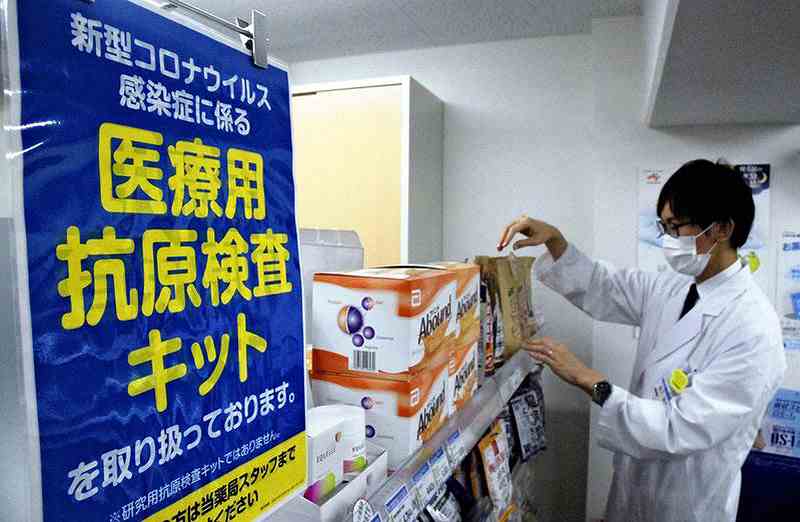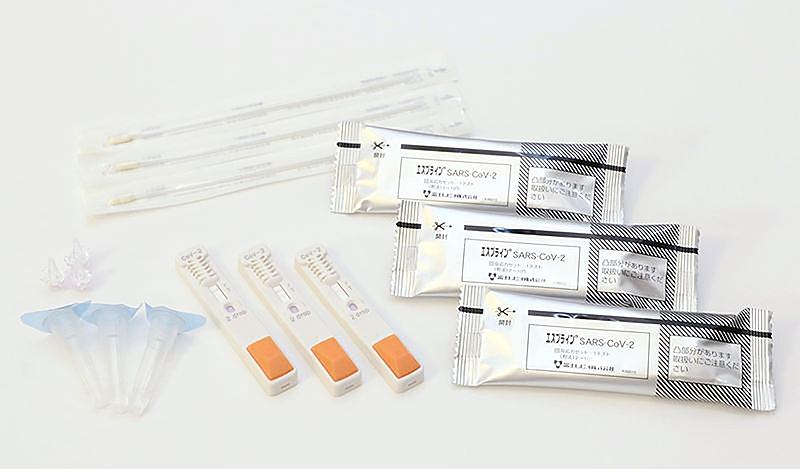
A notice at a Nihon Chouzai pharmacy in Bunkyo Ward, Tokyo, says that COVID-19 antigen test kits authorized by the health ministry are available there.
November 5, 2021
Health ministry-authorized test kits that people can use at home to check whether they are infected with the novel coronavirus are available at pharmacies and elsewhere, but the results may not be accurate if they are used incorrectly.
The Health, Labor and Welfare Ministry and other entities are therefore calling on consumers to use the kits appropriately and be aware of exactly what they are buying.
15 kinds of kits
Leading pharmacy operator Nihon Chouzai Co. began selling COVID-19 antigen test kits at its about 690 stores around the country on Oct. 11.
At a Nihon Chouzai pharmacy in the Nezu area of Tokyo’s Bunkyo Ward, the kits are being sold as a package, and a licensed pharmacist shows customers written instructions with illustrations and photos while explaining how to use them. Buyers also have to sign a consent form at the time of purchase.
A pharmacist at the store said: “We’ve been receiving phone inquiries about our stock of the kits. Some people buy them in bulk, apparently for the entire family. We hope people will take advantage of the kits, leading to swift medical examinations when necessary.”
Fifteen kinds of ministry-approved COVID-19 antigen test kits for medical use have been made available so far. There are differences in how to use them, so buyers need to confirm the proper method beforehand, for instance by following written instructions provided at the time of purchase.

Antigen test kits for COVID-19 put on the market by Fujirebio Inc.
The most common types involve collecting nasal secretions from the anterior nasal cavities, using a swab that comes with the kit. After putting several drops into the designated section of the kit and waiting a certain amount of time, the results will appear.
The test kits can be stored at normal room temperature. Used kits and swabs should be placed inside a bag and disposed of in a way that will prevent the spread of infection.
On Oct. 20, the Japanese Association of Medical Technologists in Tokyo, comprising clinical lab examiners in charge of conducting such tests at hospitals, released key points to be aware of when using the kits.
The association emphasizes that users should receive a sufficient explanation from a pharmacist and take the test using proper procedures. It also calls for people to prioritize getting checked at a medical institution over testing themselves at home if they already have symptoms such as a fever or coughing.
If a home test yields a positive result, the person in question should see a doctor, the association said.
“There’s also the possibility of a false negative,” said association vice president Tsunehiro Yokochi. “Even if the result is negative, we advise people not to take this as a guarantee and continue to take measures to prevent infection, such as wearing a mask and washing their hands.”
Check the label
The Consumer Affairs Agency is urging consumers to purchase antigen test kits labeled as “medical products for in-vitro diagnostics (IVDs) for COVID-19.”
These kits were authorized for medical use based on the law concerning pharmaceuticals and medical devices, and their accuracy has been confirmed by the state.
Test kits labeled as “for research” have also been sold at drugstores and via online stores.
The Japan Association of Chain Drug Stores (JACDS) has notified its member companies to ensure that such products are displayed in such a way that consumers will not confuse them with products approved for medical purposes.
Since November 2020, consumer affairs centers have received about 80 inquiries regarding the quality of test kits designed for research. Consumers sought advice about such complaints as false positives and necessary parts being missing.
In March this year, the agency issued administrative guidance to two business operators that had advertised test kits designed for research as being authorized by the health ministry. Such practices may constitute a violation of the Law against Unjustifiable Premiums and Misleading Representations, as it could mislead consumers into thinking a product is better quality than it really is.
The agency advises consumers to check the information on the label at the time of purchase and seek the advice of a pharmacist if anything is unclear.
Top Articles in Society
-

Man Infected with Measles Reportedly Dined at Restaurant in Tokyo Station
-

Man Infected with Measles May Have Come in Contact with Many People in Tokyo, Went to Store, Restaurant Around When Symptoms Emerged
-

Woman with Measles Visited Hospital in Tokyo Multiple Times Before Being Diagnosed with Disease
-

Australian Woman Dies After Mishap on Ski Lift in Nagano Prefecture
-

Foreign Snowboarder in Serious Condition After Hanging in Midair from Chairlift in Nagano Prefecture
JN ACCESS RANKING
-

Japan PM Takaichi’s Cabinet Resigns en Masse
-

Japan Institute to Use Domestic Commercial Optical Lattice Clock to Set Japan Standard Time
-

Israeli Ambassador to Japan Speaks about Japan’s Role in the Reconstruction of Gaza
-

Man Infected with Measles Reportedly Dined at Restaurant in Tokyo Station
-

Videos Plagiarized, Reposted with False Subtitles Claiming ‘Ryukyu Belongs to China’; Anti-China False Information Also Posted in Japan






















